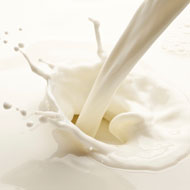Dairy farmers urged to question survival of business

Arla is the latest milk buyer to drop its prices.
The National Farmers Union (NFU) are urging dairy farmers to question whether their businesses can continue in the industry as price cuts continue to ‘decimate’ farms with no signs of let up.
In a statement, NFU chairman Rob Harrison said: “I’d urge every dairy farmer out there to seriously look at his or her own business and question whether it can survive another period of low milk prices.
“The NFU is meeting with banks regularly but take clear advice and plan ahead – I want you to speak to your own bank, your consultant and your accountant.”
On Friday (22 Jan), Arla became the latest milk buyer to drop its prices - members will see their prices fall by 0.75pp from February 1.
Furthermore, there is a small adjustment of 0.05ppl in the forecasted supplementary (13th) payment because of lower overall returns. Together these adjustments total 0.8 pence, taking the UK standard litre price to 21.81ppl.
“With no sign of a market upturn in coming months we will inevitably see a large number of dairy farmers leave the industry. No-one can continue to produce milk at a loss,” said Mr Harrison.
“Dairy farmers are rightly questioning why this is happening. We know that global factors have impacted demand and milk volumes in the UK and across Europe continue to increase with no sign of slow down. Milk contract terms and pricing schedules are being changed with no negotiation, flouting the voluntary code, and farmers are being put on notice. It is a bloodbath and those suffering the most are our hard working dairy farmers.”
The NFU are also urging milk buyers to provide confirmation that they are not taking advantage of the current market and that they are doing “all they can” to add value to every litre of British milk.
Mr Harrison continued: “My message to everyone – retailers, food service and manufacturers - now is the time to show that you support British dairy and want to see a thriving, sustainable industry in the future. Farmers want confirmation that you are serious about the future of UK dairy.”



 The Federation of Independent Veterinary Practices (FIVP) has announced a third season of its podcast, Practice Matters.
The Federation of Independent Veterinary Practices (FIVP) has announced a third season of its podcast, Practice Matters.